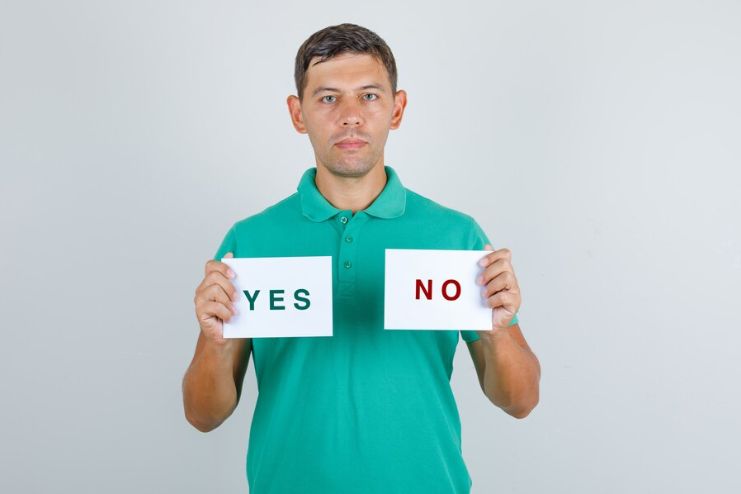AI Contribution
At HealthSpectra, we may use AI to refine grammar and structure, but every piece is shaped, checked, and approved by real people, our expert writers and editors, to ensure clarity, credibility, and care. Learn more..Affiliate Disclaimer
Some links in this article are affiliate links. We may earn a small commission if you make a purchase through these links, at no extra cost to you. We only recommend products we find useful to our readers“When you say ‘yes’ to others, ensure you aren’t saying ‘no’ to yourself.” – Paulo Coelho.
Do you often find yourself at the crossroads between happiness and social obligations? And you give in just to please others and say ‘yes’? Being politically correct and diplomatic is all fine until it crosses boundaries. Sometimes, you are overworked physically or exhausted mentally, and that’s not the right time to lend an ear to a friend.
You cannot pour from an empty cup; hence, practicing self-care and saying a firm no is essential. We often neglect our self-care and boundaries just to please others. Today’s world is fast and dynamic, and people like us are already overwhelmed with a lot on their plate. Here’s when we need to realize the benefits of saying no. If you too struggle to say a simple ‘no,’ this article is for you.
When prioritizing our well-being, we set ourselves up for growth and success. Always saying ‘yes’ to unnecessary obligations or demands can drain your energy and affect your physical and mental well-being. We tend to overcommit ourselves, which leads to burnout, stress, and no personal identity. We feel pressured to keep up our commitment, which is beyond our capacity, simultaneously making us anxious and exhausted.
The Psychological Benefits of Saying ‘No’

Saying ‘no’ can be extremely difficult for most of us, as we are mainly conditioned to be polite and humble. You may feel left out or fear a missed opportunity. You may also feel sorry or scared to damage relationships or let others down potentially. However, once you learn to refuse to accept the things that make you burn out, you’ll understand the benefits of saying ‘no.’
Keep Your Stress at Bay:
When you overcommit to things, your mental energy goes for a toss. Imagine getting an invite for which you are not ready mentally and physically. This makes you stretch too thin to accommodate that plan to please others.
Rather than causing yourself significant happiness, it drains your energy. Imagine if you had simply said ‘no’ in the response. This would have saved you from overexertion and stress and helped you manage your thoughts better.
One simple word can help you relieve and reduce stress and achieve a better balance in your life.
Focused Mental Clarity:
You plan your day, week, or sometimes month. A sudden change in plan for the day affects the entire week’s activities. Clarity of plans and actions helps you balance your life and priorities. However, you lose clarity when you give in to specific situations and say ‘yes,’ which is much against your will.
Saying ‘no’ helps you stay on schedule with your priorities and goals, make better decisions, and improve mental clarity.
Prioritize Self-Respect:
The benefits of saying no are not limited to reduced stress or improved focus. In the long run, saying no will help you gain self-respect. Setting boundaries will make people respect you and your time even more.
With each no, you reinforce and assert things that matter. This also means that you value your time and energy, and people will perceive you as a confident human with self-esteem.
Only by standing your ground can you become emotionally strong and confident and have a great sense of purpose in life.
Why Saying ‘Yes’ Can Be Detrimental

When you say ‘yes’ to a person, and you want to say ‘no,’ you build two things: burnout and resentment, especially if you like to be perceived as a nice person. This is people-pleasing and doesn’t help either of you.
Burnout:
- Saying ‘yes’ can lead to momentary happiness, not the ultimate one. Saying ‘yes’ too much can cause burnout.
- You take on more responsibilities than you can handle, leaving you over-exhausted. This can hamper your mental health and productivity.
Resentment:
- Saying a ‘yes’ that is not authentic can make you feel stressed and resentful. The resentment comes from the inability to tell a firm ‘no.’
- You may feel this way as you are overburdened, want to refrain from participating, or already have too much on your plate.
This resentment affects your relationships and creates stressful situations with friends, family, or colleagues.
Loss of Precious Time:
- It is not just resentment or burnout; saying ‘yes’ too often, against your will, takes away your precious time.
- The time that you could’ve spent on self-care activities and personal growth. You’ll have limited time for yourself and an unhealthy work-life balance.
Saying ‘yes’ too often will steal time away from you that you can never return.
When You Should Say ‘No’

Not all occasions, invites, or requests need a straight ‘no’ from you. You cannot overdo it. You must learn when to say ‘no to protect your self-care and boundaries.’ This way, you create boundaries and benefit your health and well-being.
Signs to Say ‘No’:
- A Feeling of Discomfort: Trust your gut feelings and intuitive side. If the request makes you uneasy or pushes your limits far beyond your liking, it is time to say ‘no.’
- Lack of Personal Time: You need more time to build hobbies or relax. If the activity or invite interferes with your time, it’s a clear sign to decline it.
- Fatigue: Learn to understand when you overcommit. Overcommitment leads to exhaustion and fatigue. If saying ‘yes’ makes you feel tired, saying a firm ‘no’ is best.
- Irritability: Irritation stems from over-commitment. If you feel irritated, you must say a clear ‘no’. You can always tell a clear and kind no. This frees your focus on things that matter, making you less irritable. Having peace of mind helps you align more with your goals and preserve your energy for better things.”
Tips to Say ‘No’ Nicely
Saying ‘no’ is not being selfish or rude. You can learn how to politely say no and set boundaries with people without feeling any guilt. Understand that setting boundaries respectfully has always been appreciated. All you need to do is be polite and make the other person understand. For example, you can decline a request by saying, “I cannot make it to the party, but it’s sweet of you to think of me and invite me.” This response is neither harmful nor offends anybody. Such instances help you avoid guilt, as being straightforward and respectful is a good way to say no’.
- Be assertive: Say ‘no’ confidently. You must not hesitate. Some people struggle with this confidence because they feel pressured always to say ‘yes.’ Practice different scenarios in your head in front of a mirror or even with a friend. This assertiveness helps you say no firmly when the time comes and improves your mental health in the long run.
- Be empathetic: Empathy helps connect people, and it always helps in real life. Express empathy while saying ‘no’ while making clear that your self-care and boundaries are non-negotiable. By doing this, people perceive you as a kind human who addresses their needs yet maintains your boundaries.
Conclusion

It’s okay to be human, to say no, and to focus solely on self-care. The benefits of saying no are plenty. We understand that you like to be perceived as a nice person and help people. However, crossing your boundaries and disturbing your peace and mental health just to please others is not the right thing to do. Saying no is an essential tool for setting boundaries and prioritizing your needs.
While you may feel uneasy at first, it gets better as you start taking a stance for your self-care needs. You are not unkind or self-centered if you decline a few things; you are only creating a space that’s best for your growth. It is also okay to take a break from commitments once in a while. If you stop saying an unnecessary ‘yes’ all the time, you will observe that you are a happier person, have healthy relationships, and achieve your goals.
Saying no to others is saying ‘yes’ to your commitment. You are not rejecting others but are making way for your sanity and peace of mind. Take time out for yourself rather than engaging in activities that do not excite you. This reduces stress and improves overall physical and mental health and happiness.
Take small steps, practice regularly, build confidence, and say ‘no’ effectively.
Remember, every ‘no’ creates space for a more meaningful ‘yes.’
In this Article





















